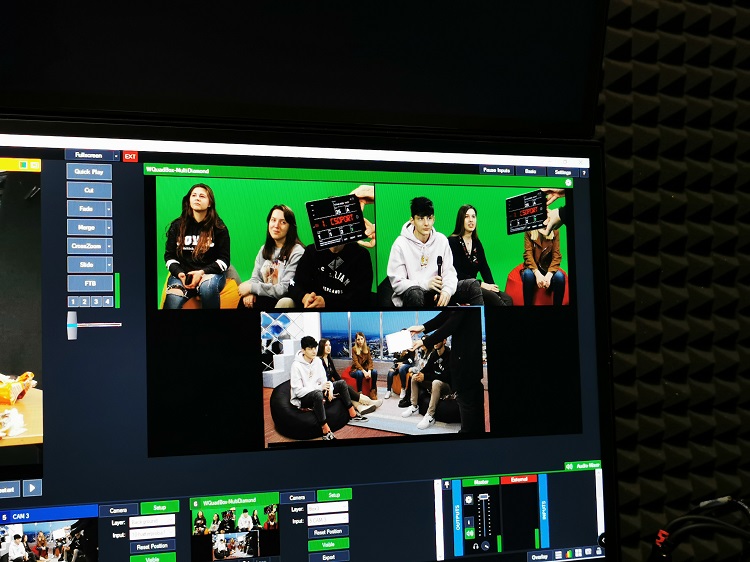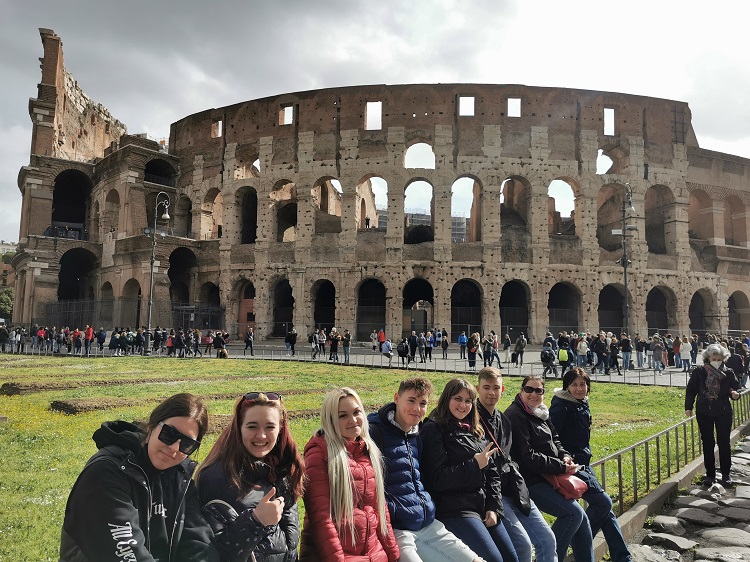
A project where students reached a level of media literacy and humanity at the same time. Sensitising students through filmmaking and film itself was part of a partnership project at Terézváros Technical and Vocational School of the Budapest Business Training Centre. We talked to Nikolet Cseri, Erasmus+ project coordinator.
The Erasmus+ programme makes dreams come true
We talked to Nikolet Cseri, Erasmus+ project coordinator.
What was the main objective of the project Developing ICT and Social Skills by Cinema?
We wanted to implement afilmmaking programme with the participation of students to explore the issues of exclusion, discrimination, and abuse. We structured the project in such a way that we could take it from the first stages to the last, from the idea to the realization, i.e., to the finished film. This required five meetings, which were the most important milestones.
How was the partnership built?
With Hungarian coordination, the partnership was formed by Italian, Turkish, Portuguese, and Greek schools. Our project was primarily aimed at high school students, so the age range was between 15 and 20. Among the schools there were high schools preparing their students for university studies, and we, as a vocational training institution, for example, involved vocational school students in the joint work.

What are you most proud of?
We produced five short films on different topics, which can be used either in foreign language classes or in home class periods, as the students tackled important social issues, such as exclusion, racism, prejudices, and stereotypes. We also produced a collection of award-winning short films and a collection of methodological materials, that we have already used in internal teacher training. As a result, colleagues who are not actively involved in the project are also producing short films for illustration and summarisation. The same is also true for students who have not only developed their own social media presence, but also have submitted homework assignments in video presentations, and even made a short film for the prom.
What was your most memorable moment?
We had many memorable moments during the implementation. It is hard to choose between shooting in Greece, where we could shoot on the beach with professional equipment, or walking among the sets of Rome's Cinecittá, the setting for classic films like Ben Hur or Cleopatra. Perhaps the highlight of the closing session was the opportunity for the participating students and their teachers to watch their short films in a theatre, in a real gala atmosphere.

On a personal level, how has the project affected you as coordinator and teacher?
I have been actively involved in international projects since 2009, and I have also been the project coordinator of our institution since 2013, but this was the first time I had a coordinating role from proposal writing to implementation. The work of five countries had to be coordinated in three time zones, and although I studied management at university, the real, international experience can be gained in such a situation. As a teacher, I learned new methods and techniques that I will apply in the long term. However, what I think is most important as a teacher and coordinator is that I can create opportunities for students who would not be able have them without Erasmus+. When a teenage student sees the ocean for the first time or gets on a plane for the first time, it gives new strength for the further work. We fulfil dreams by making projects a reality.
To whom would you recommend the School and Kindergarten Partnership calls in which the project was implemented?
I would encourage all colleagues to take the plunge and give it a try – from primary school to high school. One of the biggest advantages of partnerships is that students can use the foreign language they are learning, work in groups while seeing the world. And for teachers, it is a great way of cooperation, as the experience of being abroad and getting to know the life of another school is a huge benefit.

What does winning the Excellence Award mean to you?
The Award of Excellence is a professional recognition that confirms that we are doing our job well. We are a small institution with few teachers, and with relatively few students, many of whom have special educational needs or difficulties in integration, learning and behaviour. I am immensely proud of ourselves, as this award includes all the hard work that not only those actively involved in the project, but also the others have put in to make our plans a reality. For our institution, it means that the supportive environment we enjoy within our teaching staff can lead us and our students to such success.
|
Institution: Terézváros Technical and Vocational School of the Budapest Business Training Centre Project title: Developing ICT and Social Skills by Cinema Measure: School and kindergarten partnerships, public education sector (KA2 SCH) Coordinator: Nikolett Cseri Project website: sites.google.com/view/develcinema/ |
Boglárka Simon
Tempus Public Foundation,
Directorate of Communication
Last modified: 19-12-2023















